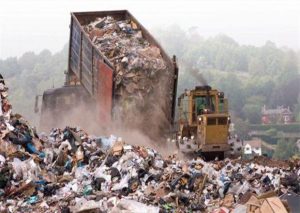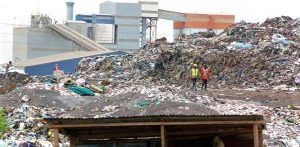DR. YAW AGYEMAN Boafo (PhD), Senior Research Fellow at the University of Ghana, Legon, has indicated that waste foods are major contributors to greenhouse emissions which affect or influence climate change across the globe.
He said Ghana’s climate change experience, has been significantly influenced by the amount of waste foods exposed to the atmosphere.
Dr. Boafo posited that when waste foods, as well as other forms of waste, are exposed to the atmosphere, these release methane gas, which among other negative effects, contributes to the depletion of the ozone layer in the atmosphere.
Methane, also known as marsh gas or methyl hydride, is a colourless, odourless flammable gas, which is the main constituent of natural gas.
“When you talk about the most dangerous of gases which is causing harm to the atmosphere or to the climate, it is methane”, said Dr. Boafo.
“Methane is not that much [in the atmosphere], but did you know that when you throw away all the food and when they are decomposing, they release a lot of methane gases?
“So all the food that you throw away releases methane gases which also grows to also create that sort of depletion of the ozone that we are talking about. So it is a major challenge as far as we are concerned,” he explained.

He said apart from methane contributing to the depletion of the ozone layer, studies have shown that high levels of methane can also reduce the amount of oxygen in the air, and this has the potential of resulting in mood changes, slurred speech, vision problems, memory loss, nausea, vomiting, facial flushing and headache.
The university don added that in severe cases, there could be changes in breathing and heart beat, numbness, balance problems and unconsciousness.
Landfill Sites
Dr. Boafo further stated that landfill sites are also “most important sources” of methane gases, lamenting that their existence in Ghana, especially when left open, pose a huge threat to the health and livelihoods of the people.
“Landfill or waste sites are the most important sources of methane gases. So, with all the ones [landfill and waste sites] that we have had over the city in the last few years or many many years ago, it is very dangerous; and these have caused a lot of what we call climate change problems,” he intimated.
Findings
According to the UCAR Center for Science Education (UCAR SciEd), although the concentration of methane in the earth’s atmosphere is small (around 1.8 parts per million), it is an important greenhouse gas since it is a potent heat absorber.
The concentration of methane in the atmosphere has risen by about 150% since 1750, apparently largely due to human activities, with methane accounting for about 20% of the heating effects by all of the greenhouse gases combined; with its supply to the earth’s atmosphere facilitated by both natural and human sources.
Way Forward
Dr. Yaw Agyeman Boafo, addressing ways by which methane and other greenhouse gases could be reduced in Ghana’s atmosphere, suggested that landfill sites should be converted into other “useful purposes” while government and other stakeholders explore other eco-friendly ways of discharging waste in the country.
To buttress his point, he cited how a lady, also at the University of Ghana, Legon, had successfully managed to convert an on-campus dumpsite into a more purposeful site “where she grows flowers and other stuff”.
“So landfills need to be captured and converted so that these cannot just release [gases]. If you leave these open, they release all the methane and that becomes a problem for climate change and adaptation,” he stressed.
This report is produced in fulfilment of the UNESCO and CIJ London Climate Change in News Media project facilitated by the Centre for Journalism Innovation and Development (CJID).

BY Nii Adjei Mensahfio


